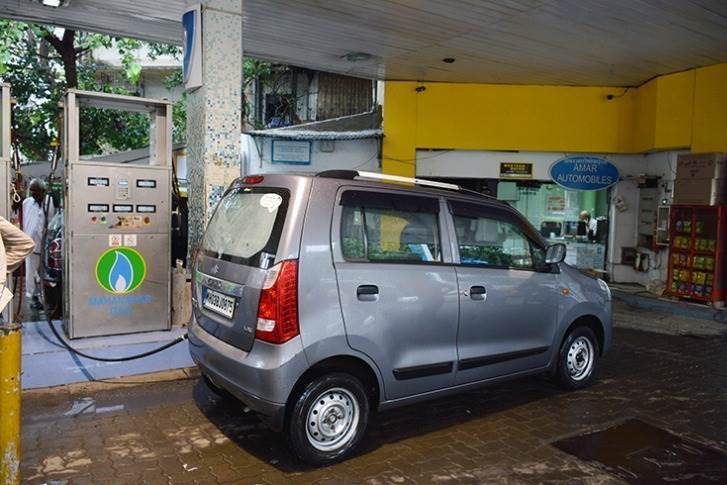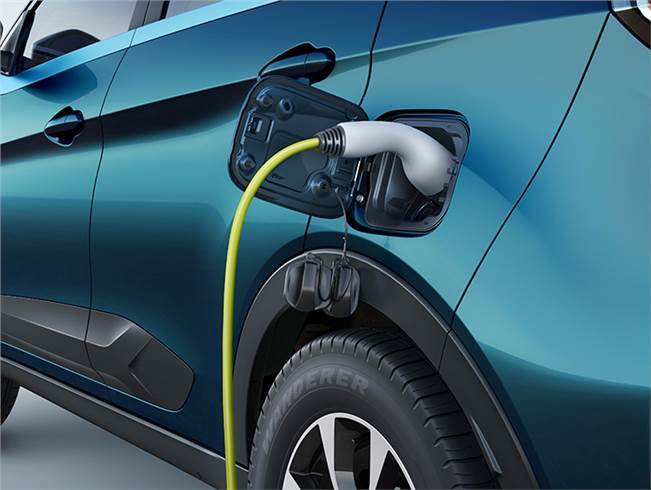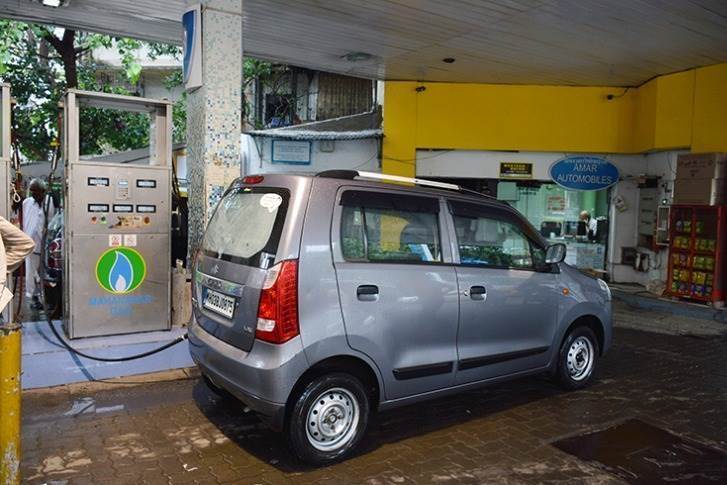Exactly a month after the price of CNG (compressed natural gas) was raised for the seventh time, the eco-friendly gas sees its eighth price hike. As per media reports, from midnight of November 4-5, Mahanagar Gas’ price hike of Rs 3.5 per kilogram in Mumbai has come into effect. This takes the price of CNG to Rs 89.50 per kg, up 4% in 30 days. On October 5, CNG price had risen by Rs 6 a kg to Rs 80 a kg, reversing the Rs 6 cut effected on August 17.
With global prices of natural gas rising sharply and in India by 40% from October 1, a further hike in the price of compressed natural gas (CNG) was only to be expected as mentioned in Autocar Professional’s October 6 report.
At 89.50 per kg with the eighth price hike in the year to date, CNG price has now scaled a new peak and hit an all-time high. CY2022 has also seen two CNG price reductions, the last one on August 17 – by Rs 6 per kg – and the previous one – also by Rs 6 a kg – on April 1 (see data below).
CNG PRICE UP 81% IN 21 MONTHS
November 5, 2022: Rs 89.50
October 5, 2022: Rs 86 (up by Rs 6, from Rs 80)
August 3, 2022: Rs 86
July 13, 2022: Rs 80
April 30, 2022: Rs 76
April 12, 2022: Rs 72
April 5, 2022: Rs 67
January 8, 2022: Rs 66
December 17, 2021: Rs 63.50
November 27, 2021: Rs 61.50
October 7, 2021: Rs 57.54
July 13, 2021: Rs 51.98
February 8, 2021: Rs 49.40
TWO PRICE CUTS IN CY2022
August 17, 2022: Rs 80 (by Rs 6 per kg)
April 1, 2022: Rs 60 (by Rs 6 per kg)
Price per kg of CNG in Mumbai
Over 21 months, from February 8, 2021 through to November 4, 2022, CNG prices (in Mumbai) have risen by 81%: from Rs 49.40 per kg to Rs 89.50. That’s a rise of Rs 40.10 per kg of CNG which seriously impacts the low-cost-of-ownership mantra that CNG vehicles offer and their manufacturers bank on.
Meanwhile, oil is on the boil again and crude oil prices have risen to their highest levels in nearly four weeks.
Fast-reducing price arbitrage of CNG
One of the compelling reasons for personal passenger vehicle users as well as owners of CNG-powered commercial vehicles has been the substantial price differential versus petrol and diesel albeit that has now reduced sharply. On November 5, petrol pricing in Mumbai is Rs 106.29 a litre and diesel is Rs 94.25 a litre – fossil fuel prices have remained unchanged since May 21, 2022, which makes today the 167th day since prices have remained stable. That when the Centre had slashed excise duty by Rs 8 a litre on petrol and Rs 6 on diesel to tame inflation.
Now that price arbitrage which benefits CNG vehicle users and CNG vehicle manufacturers is sharply reducing. At Rs 89.50 per kg, the price differential versus petrol has dipped below Rs 20 for the first time to Rs 16.79 and to Rs 4.75 for diesel.
Twenty-one months ago, on February 8, 2021, the price differential between CNG and petrol was Rs 44.09, given the prevailing CNG price of Rs 49.40 per kg and Rs 93.49 for a litre of petrol in Mumbai. That price differential has now halved.
Nonetheless, if one factors in CNG’s inherently higher fuel efficiency being 1.5 times that of petrol, it still offers increased savings with CNG. Now with the price differential coming down fast, the lower cost of ownership with CNG vehicles is coming under a scanner.

Price hikes could impact demand for CNG cars
Given the high prices of petrol and diesel, sales of CNG-powered cars have been growing over the past few years and major PV OEMs like Maruti Suzuki, Hyundai Motor India and Tata Motors have expanded their CNG portfolios.
In FY2022, the passenger vehicle segment saw CNG-powered sales clock near-55% YoY growth with sales of 265,383 units, accounting for 8.64% of total PV sales of 3,069,499 units compared to 6.30% CNG PV share in FY2021. That growth rate is noiw slowing down with the consistent price hikes in CNG. Nevertheless, some OEMs remain bullish on CNG.
On September 26, Tata Motors launched the Intra V20, India’s first bi-fuel (CNG & petrol) commercial vehicle with a payload of 1,000kg and a claimed 700km range, aiming to make inroads into the commercial pickup market.
On October 31, 2022, Maruti Suzuki India expanded its factory-fitted CNG model range to 12 models with the inclusion of the Baleno and XL6, the first of premium Nexa models to get the CNG range. India’s passenger vehicle market leader remains bullish on CNG demand and has ramped up CNG vehicle manufacturing capacity to 35,000 units a month since August 2022.
Maruti Suzuki India has an order backlog of around 400,000 units, of which CNG models account for 125,000 units. While the Wagon R remains the one with maximum demand, with up to 40 percent of its sales coming from CNG variants, the recently-introduced Swift CNG has so far seen a 13 percent sales penetration.
According to Shashank Srivastava, senior executive director, Marketing and Sales, the carmaker is registering an average of 1,320 daily new bookings for CNG cars in its portfolio, and it is likely to further increase with the introduction of the Baleno and XL6 CNG.
Speaking to Autocar Professional recently, he said: “However, with a faster increase in CNG prices compared to petrol or diesel, the price advantage has reduced, therefore, impacting demand for CNG cars. But at the same time, there continue to be customers who are looking for lower running costs.”
The company, which plans to roll out more CNG models, with its Brezza compact SUV likely to be the next launch, remains optimistic about a CNG price rationalisation, particularly with government intervention and the war coming to end. “If the war ends sooner, there is a possibility of the prices settling down to an even lower level,” said Srivastava.
Now, with continued price hikes, demand could slow down for CNG cars. And there are also wallet-friendly reasons for motorists to shift to electric vehicles.

Will rising CNG prices drive consumers towards EVs?
While it is difficult to say whether CNG prices will keep moving upwards, given the growing demand for the fuel in India both for motoring and household usage, the fact remains that CNG vehicle running costs are significantly lower compared to petrol or diesel as a CNG vehicle inherently gives better fuel economy.
A few challenges remain though. Refuelling takes longer due to a fewer number of CNG stations and highway driving requires additional planning in terms of trying to take a route with a CNG station. At present, there are an estimated 1,332 CNG stations and plans are to substantially increase the existing parc of 4,500 CNG stations to 8,000 in the next two years. Also, servicing costs of CNG-powered cars are higher compared to petrol siblings with the CNG filter requiring scheduled replacement in factory-fitted CNG kits.
Passenger vehicle and three-wheeler buyers now have another option – electric vehicles. While the initial cost of an EV is higher than a CNG or petrol/diesel model, the much lower cost of EV ownership in the long run is very attractive. With the Central and state governments offering a host of subsidies, the fast-expanding EV charging infrastructure and also banks and financing institutions plugging into the EV growth story, it is likely the CNG sector’s loss could be the EV industry’s gain.
(With inputs from Mayank Dhingra)
ALSO READ Electric car sales in India register 268% growth to cross 18,000 units in H1 FY2023
Delays in MoRTH guidelines for BS VI CNG kits hurting retrofit business
